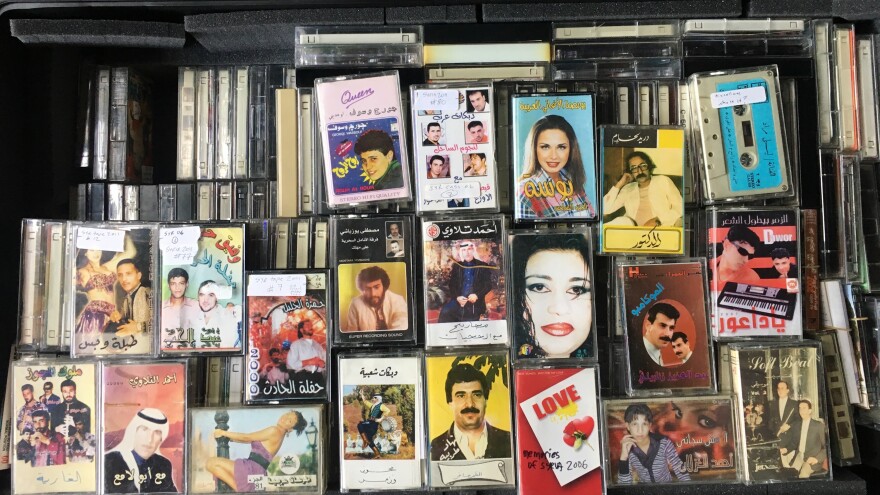When Yamen Mekdad was a teenager in Damascus, Syria, there was one place he'd go almost every day: his friend's cassette shop.
"So I'd just sit with him, hang out with him, smoke cigarettes and just listen to the new music," Mekdad tells All Things Considered. "Punk music, or like Gregorian ... so it was always a trip to explore the unknown for me."
At the same time, unbeknownst to Mekdad, Mark Gergis began to rediscover the Arabic music from his childhood – which eventually brought him to Syria and its multitude of music kiosks.
"They'd often just be blaring that week's popular tape at full volume – just next to another cart, whose owner would have his favorite tape blaring at an even greater volume," Gergis recalls. "So it was this beautiful cacophony."
Two decades later, in 2018, Gergis and Mekdad met, and began to digitize their old cassette tapes in order to help preserve that era of music – especially as the civil war scattered Syrian culture. Now, their collection is living online and growing. It's called the Syrian Cassette Archives.
This conversation has been edited and condensed. To hear the broadcast version of this story, use the audio player at the top of this page.
Ari Shapiro: By making this a cassette archive, you zero in on a period in time. What is it about the cassette, specifically?
Yamen Mekdad: I think, specifically in the global south, the cassette medium just democratized the process even more so than the rest of the world due to the complexity of producing records, vinyl records. For example in Syria, there were no pressing plants. So for you to reach a level where you can press a record you have to be an artist that reached a prestigious level. When cassettes were introduced in the '70s, that changed the game. A lot of these musicians were functional musicians – they would perform at weddings, at festivals locally. But when the cassettes were introduced they were able to record in a DIY setup ... and distribute outside the region.
The city of Aleppo has been a melting pot for centuries – right along the Silk Road, and the influences from all over the world are reflected in the food and the architecture. A lot of the music in your collection comes from Aleppo.
Mark Gergis: Aleppo was the primary hotbed for cassette production companies. We can hardly count the number of them that came and went. Some endured for decades. But after 2011 [and the beginning of the Syrian civil war], some of these longstanding music companies disappeared overnight. In our research we've located a few of them ... but many remain untraceable.
It's really hard to talk about the rich diversity and beauty of Aleppo without also talking about how devastated it was by the Syrian civil war. This would be a historical archive of great value, even if the war had not happened – but how do you think about it in the context of what's been lost?
The idea for an archival project came during the horror of watching from afar as Syria fell into war and destruction after 2011, and learning of friends and contacts suffering unthinkable trauma and displacement, even death. So I started looking at the cassettes ... with new eyes. The collection has taken on an unfortunate new gravity.
The stories behind that era and the tapes and the makers behind them also had such a largely undocumented narrative. We really felt that it was time to focus on them.
Yamen, when the Damascus that you grew up in is forever changed – the Damascus you remember is gone. What value does that add to a collection like this?
Mekdad: I was in Damascus two months ago for some time ... definitely things have changed. Definitely things are extremely hard at the moment, especially economically due to sanctions and government policies and so on. But the magical thing about that place [is] that people always persevere, they still do their thing. Within all this heartache they're still creative and loving and believing.
There are two sides to it – the archiving aspect where we're preserving but also how can we push forward and engage and stay alive and dream of how this can still be part of our future identity somehow.
To hear the broadcast version of this story, use the audio player at the top of this page.
Copyright 2022 NPR. To see more, visit https://www.npr.org.





